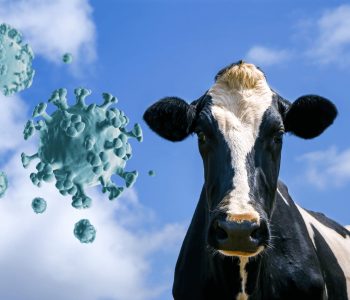Build Resilience in Your Herd to Avoid Pathogen Challenges
Pathogens are constantly attacking your cows. They come in many forms—viruses, bacteria, mycotoxins and more—and continuously have the ability to rob your cows of their health and productivity.
The “bad actors” threatening feed hygiene come in many different forms:
Clostridia frequently contaminate forages and their populations have been found to grow in the TMR over time. They are everywhere in the environment.
In fact, ARM & HAMMER™ has analyzed 30,000 fecal samples and 7,000 feed samples across the United States for clostridia and other detrimental organisms. Of the samples analyzed, 98.6% of fecal samples and 84.7% of feed samples contained detectable clostridia. This same survey also found that 78.5% and 33.6% of fecal and feed samples, respectively, contained C. perfringens, a toxin-producing clostridia known to contribute to hemorrhagic bowel syndrome (HBS) in dairy cattle.1
Salmonella and E. coli, when found in silages and the TMR, suggest poor silage fermentation or manure contamination during feed-out, feed mixing or delivery.
If spoilage occurs in forages, high levels of yeasts and molds can end up in the TMR. Yeasts and molds can steal valuable nutrients from the cow and may cause inconsistent intakes or impact performance. Mycotoxins are secondary metabolites produced in feeds by various species of molds. Although the rumen microbial community is able to detoxify many different mycotoxins, a dairy cow’s high rate of feed intake and feed passage out of the rumen make it unlikely for complete detoxification of mycotoxins that find their way to the small intestine.
Be proactive: create resilient cows
Since mycotoxins are too prevalent to completely mitigate, it’s important to focus on a proactive defense that creates resilience in your cows to help them avoid, or minimize, the effects of pathogen challenges. Now more than ever, preparing your cows to help them fight off disease challenges is critically important. The following are three important steps to build resilience:
- Strengthen immunity: A healthy immune system is one of the cow’s best chances to avoid a health challenge, and the proactive strengthening of the cow’s’ immune system is the main driver of establishing herd resilience. In your ration, consider including products such as CELMANAX™ from Arm & Hammer Animal and Food Production.
CELMANAX contains Refined Functional Carbohydrates™ (RFCs™) that support growth of beneficial bacteria and prevent certain pathogens from attaching to the intestinal wall and cause disease. CELMANAX combines the benefits of multiple feed additives in one consistently high-quality formula.
2. Bolster gut health: The gut microbiome— from the rumen through the
CERTILLUSTM from Arm & Hammer Animal and Food Production offers dairy-specific Bacillus strains to enhance the microbial environment inside your cows. This creates a better gut environment and improved rumen function by enhancing the role of beneficial bacteria to help cows deliver more consistent production and withstand various health challenges.
Work with your nutritionist to create and feed Bacillus strains specific to your cows’ environment to make their impact even more effective.
Your nutritionist and veterinarian can help create a program to build resilience in your herd and keep viruses, bacteria, mycotoxins and other pathogens at bay.
Work with them to put together a strategy that includes key nutrition components to strengthen immunity and create a robust environment inside the gut.
Learn more at ahfoodchain.com
